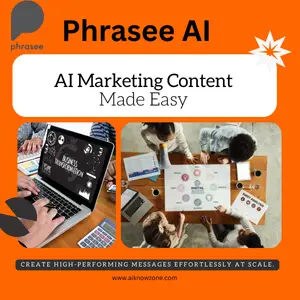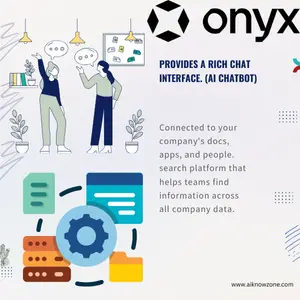Syft
Explore how Syft AI connects companies around value and automates sales processes for B2B revenue teams.
Description
Syft AI Review: Is Value Matching the Future of Sales?
Okay, let’s dive into Syft AI! 🎉 From what I’ve gathered, this SaaS application is designed to automate and scale value selling for B2B revenue teams. Essentially, Syft aims to connect companies around value, what they call “value matching.” Sounds pretty ambitious, right? In a world where sales processes can be clunky and inefficient, Syft promises to streamline operations and accelerate those crucial connections. What really caught my eye is its focus on using AI to find companies with problems your product can solve, and then explaining how your product solves them. It even recommends contacts to engage. Imagine the time saved and the potential for more effective outreach! I’m always on the lookout for tools that can make sales teams more efficient and effective, and Syft‘s approach seems genuinely innovative. Could this be the solution for B2B companies struggling to bridge the gap between their products and the needs of potential clients? Let’s dig deeper and see what Syft AI is really all about and if it lives up to the hype.
Key Features and Benefits of Syft AI
Let’s break down what Syft actually does. It’s not just buzzwords and AI hype; there are some solid features here, aimed at making life easier for sales teams and actually boosting the bottom line. Think of it as the AI-powered assistant you always wanted, but for value selling. From what i can see it offers a lot of efficiency. Here are a few key features and benefits based on the information available:
- AI-Powered Value Matching: Syft‘s AI identifies companies with problems your product can solve. This is huge, as it takes the guesswork out of lead generation and ensures you’re targeting prospects who genuinely need what you’re selling.
- Automated Value Story Generation: The AI summarizes a value story or email by taking solvable problems and matching them with your company’s solutions. Talk about saving time! Crafting compelling value propositions can be a major time sink, so this automation is a game-changer.
- Intelligent Contact Recommendations: Syft recommends contacts to engage within target companies. No more cold calling random people – you’re connecting with the decision-makers who are most likely to be interested in your product.
- Prioritized Account Management: The platform uses data, real-world events, and custom fields to prioritize accounts across territories. This ensures that sales teams are focusing their efforts on the most promising leads, maximizing their chances of success.
- Hands-Free Updates: While this feature seems to be specific to Cyft AI for MSPs (Managed Service Providers), the ability to update tickets and log billable hours hands-free via voice could be a significant time-saver for field technicians and other professionals on the go.
How Syft AI Works (Simplified)
Okay, so how does Syft work in practice? From what I understand, it’s all about streamlining the sales process with AI. It starts by gathering data from various sources to identify companies that might benefit from your product or service. The AI then analyzes this data to match potential clients with specific solutions your company offers, summarizing this into a value story or email. Finally, it recommends the best contacts within those companies for you to reach out to. In essence, Syft automates the process of identifying, understanding, and engaging with potential customers, saving sales teams valuable time and effort. It’s like having an AI-powered research assistant that does the heavy lifting for you, so you can focus on building relationships and closing deals. No more endless hours spent sifting through data and crafting personalized pitches – Syft takes care of that for you! The core value proposition here is efficiency and effectiveness – doing more with less, and targeting the right prospects with the right message at the right time.
Real-World Use Cases for Syft AI
Alright, let’s get practical. How could Syft actually be used in the real world? Here are a few scenarios where I could see Syft being a total game-changer:
- Scenario 1: Sales team targeting SaaS companies: Imagine you’re selling a cybersecurity solution. Syft could identify SaaS companies that have recently experienced a data breach or are rapidly scaling and need to bolster their security infrastructure. It could then generate a value story highlighting how your solution prevents similar breaches and ensures compliance. The AI would recommend the CISO or CTO as the ideal contact.
- Scenario 2: MSP streamlining operations: An MSP could use the Cyft AI (the MSP-focused version, it seems) to allow technicians to update tickets and log billable hours hands-free while on-site. This saves time, reduces errors, and ensures accurate billing.
- Scenario 3: B2B company launching a new product: When launching a new product, identifying the right target audience is crucial. Syft can analyze market trends and identify companies that are facing the problems your new product solves. It can then help craft targeted messaging that resonates with those potential customers.
Pros of Syft AI
Okay, let’s list the good stuff. Based on the information I’ve gathered, here are some of the main pros of using Syft AI:
- Improved Efficiency: Automates key aspects of the sales process, saving time and resources.
- Enhanced Targeting: Uses AI to identify and prioritize the most promising leads.
- Personalized Messaging: Generates value stories tailored to specific prospects.
- Data-Driven Insights: Leverages data to inform sales strategies and improve decision-making.
- Hands-Free Convenience: For MSPs using Cyft AI, the hands-free update feature can be a major time-saver.
Cons of using Syft AI
Now, let’s be real – no tool is perfect. Here are some potential downsides or limitations of Syft AI based on the available information:
- Reliance on Data: The accuracy of Syft‘s recommendations depends on the quality and completeness of the data it uses. If the data is outdated or inaccurate, the results may be skewed.
- Potential for Over-Reliance: It’s important to remember that Syft is a tool, not a replacement for human interaction. Sales teams still need to build relationships and close deals.
- Learning Curve: While Syft aims to simplify the sales process, there may be a learning curve associated with setting up the platform and understanding how to use its various features effectively.
- Pricing Uncertainty: I couldn’t find specific pricing details, so it’s difficult to assess the cost-effectiveness of Syft without more information.
Syft Pricing
Unfortunately, I couldn’t find any specific pricing information for Syft AI on their website or in the search results. You’ll likely need to contact them directly for a quote based on your specific needs and team size. This is pretty common with SaaS platforms, as pricing can vary depending on the features you need and the number of users. So, if you’re seriously considering Syft, reaching out to their sales team for a personalized demo and pricing estimate is the next step.
Conclusion
In conclusion, Syft AI seems like a promising tool for B2B revenue teams looking to automate and scale their value selling efforts. Its AI-powered value matching, automated story generation, and intelligent contact recommendations could significantly improve efficiency and effectiveness. While the lack of pricing information is a slight drawback, the potential benefits of Syft make it worth exploring for companies seeking to streamline their sales processes and connect with the right customers. If you’re tired of cold calling and generic pitches, Syft could be the solution you’ve been waiting for. I would recommend that companies with large sales teams that need lead generation and help with creating value proposition pitches check out Syft.






Reviews
There are no reviews yet.